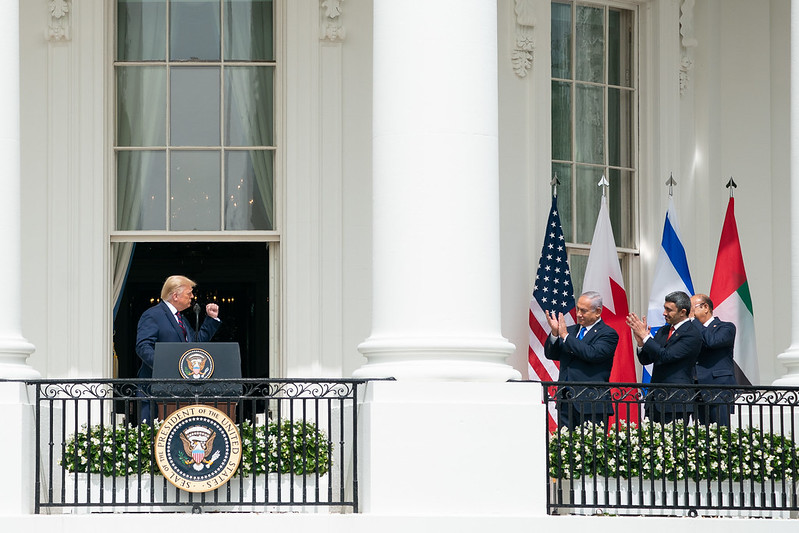
US President Donald Trump has generally pursued a foreign policy full of inconsistencies and contradictions, but that doesn’t apply to his approach to the Middle East. He has consistently targeted Iran as a menace and forged an anti-Iranian Arab–Israeli alliance to counter Tehran and its allies. Will his strategy pay off?
Trump has thrived on a ‘divide and rule’ policy at home and abroad. He is the first American leader to score well in enticing some of the Gulf Arab kingdoms to join hands with Israel to confront ‘the Iranian threat’. Hence his brokering of normalisation-of-relations agreements between Israel and the United Arab Emirates and Bahrain.
Trump wants Tehran to renegotiate the landmark 2015 Iran nuclear agreement, the Joint Comprehensive Plan of Action, from which he withdrew the US in 2018, and to retrench its military capability and regional influence according to American interests.
He has subjected Tehran to a policy of ‘maximum pressure’ to make it buckle under the weight of increased US sanctions at a time when Iran has also been hit hard by Covid-19. As Tehran has remained defiant, he has racked up pressure by seeking to use the JCPOA’s ‘snapback’ clause to restore all the pre-JCPOA United Nations sanctions against Iran, despite the US not being a party to the agreement anymore.
While lambasting Tehran for shirking some of its commitments to the agreement in response to his actions, he has ignored Iran’s legal right to do so under the same ‘snapback’ clause as long as it remains a party to the agreement. Not surprisingly, the other signatories to the JCPOA, Britain, France, Germany, Russia and China, say any attempt by Trump to reimpose the UN sanctions is ‘illegal’ and have confirmed once again their support for preserving the agreement as an important measure for regional stability and international security.
Trump
says his policy actions are necessary to build a peaceful and stable Middle East. But they stand to backfire on a number of fronts.
The president’s policy of pressuring the Iranian Islamic regime to give in or die has caused maximum damage to the Iranian society, without necessarily endangering the survivability of the regime. The ruling clerical stratum has learned how to circumvent and cope with American sanctions for most of its life since 1979. It has developed all the needed religiously based pragmatic and nationalist mechanisms and measures for self-preservation, with a capacity to contain internal dissent and stand up to external challenges.
In response to US pressure, it has strengthened Iran’s strategic ties with America’s major adversaries, China and Russia, and maintained at significant cost its regional allies—including the Syrian Bashar al-Assad government, the Iraqi Shia militias, the Lebanese Hezbollah and Yemen’s Houthis—as part of a broad security architecture.
Trump may find it in his interest to provoke Iran into a confrontation, but Tehran’s approach is to wait until the outcome of the November US election. Democratic candidate Joe Biden has indicated that if he wins the election he will restore America’s participation in the JCPOA—although Trump is doing everything he can to make it impossible for him to do so.
The Trump administration is today more isolated than Tehran internationally. Not only America’s traditional European allies, Britain, France and Germany, but most of the global community have lined up behind Iran as being on the right side of international law. Trump is widely recognised as someone who has persistently flouted international norms and law at will. The cross-Atlantic rift has never been greater, and America’s adversaries have never been more emboldened.
Trump’s apparent goal of an anti-Iran regional front cannot serve the cause of regional stability and security. The 1979 and 1994 Egyptian and Jordanian peace treaties with Israel brought no let-up in the Israeli–Palestinian conflict, and the latest UAE and Bahrain deals with Israel are also unlikely to succeed in doing that.
And should Saudi Arabia join the chorus of peace deals with Israel, which is likely at some stage, that could be seen as a Judeo-Christian – Sunni Islamic alliance, given Riyadh’s historical claim to be the leader of Sunni Islam. This carries the risk of not only deepening the rift with Shia Islam, championed by Iran, but also playing into the hands of violent Muslim extremist groups, such as al-Qaeda and the so-called Islamic State.
Trump’s accelerated Middle East policy actions, when combined with making peace with America’s past ‘terrorist’ enemy, the Taliban, to withdraw US troops from Afghanistan, are more geared towards enabling Trump to score domestically than marking the dawn of peace in the region. They are bound to deepen hostile lines between the US and its allies on one side and Iran and its supporters on the other.
That will erode the chances of engendering meaningful regional cooperation that could transform the Persian Gulf and indeed the wider Middle East from a zone of ‘frenemies’ to one of peace and stability.
 Print This Post
Print This Post